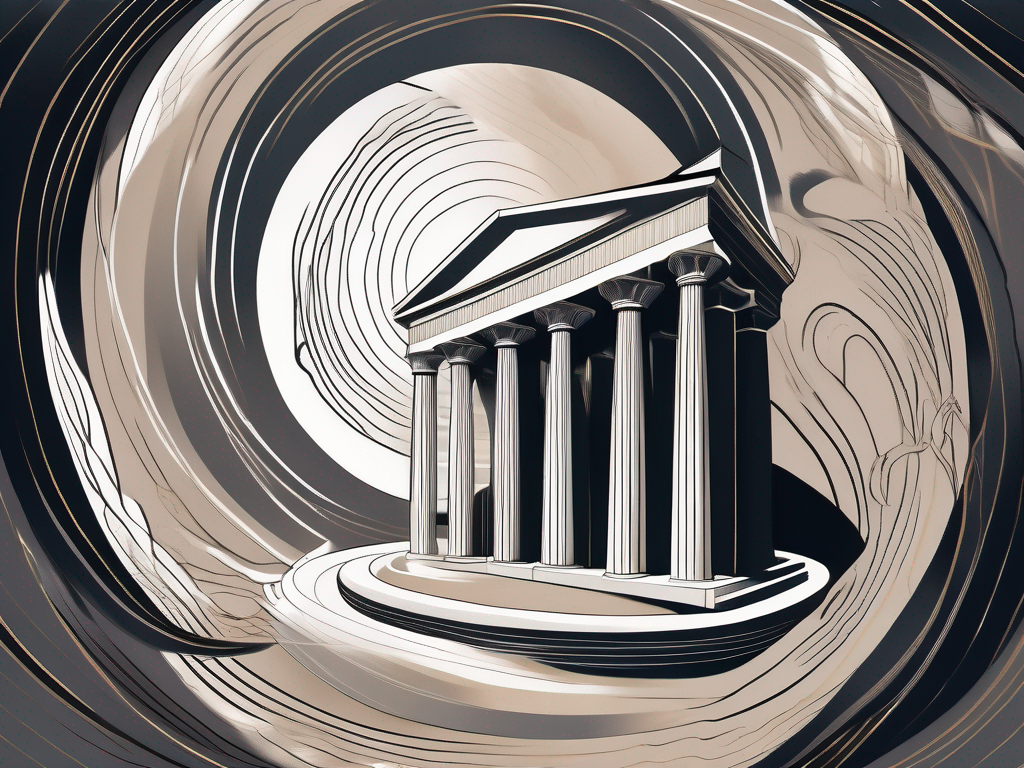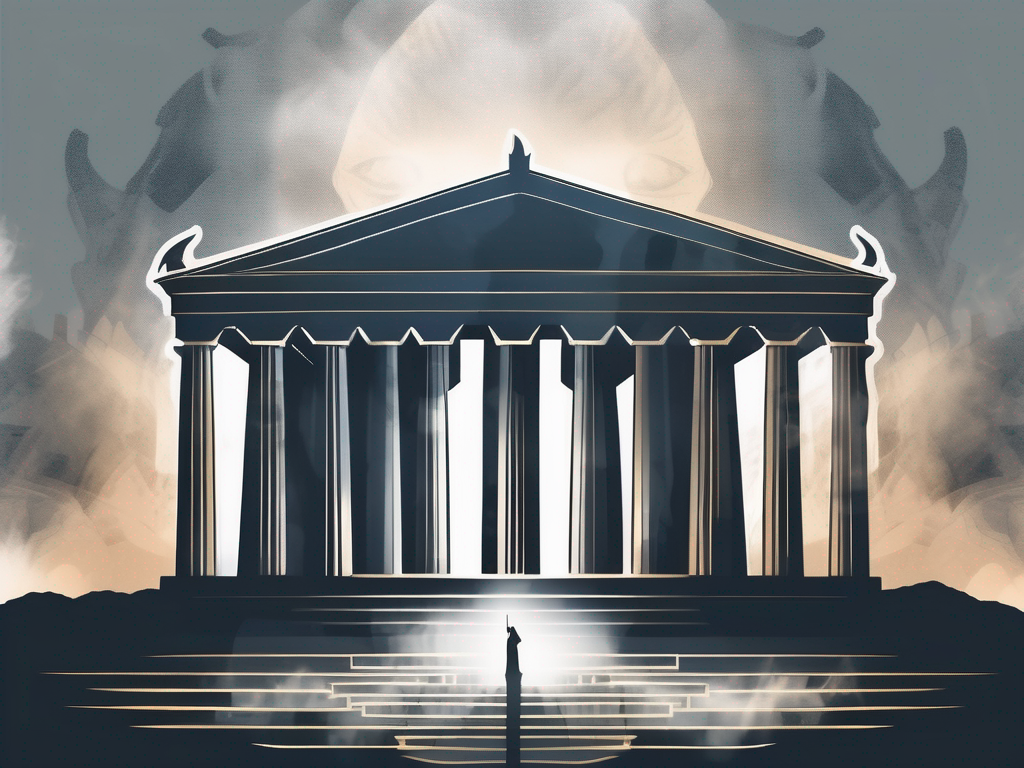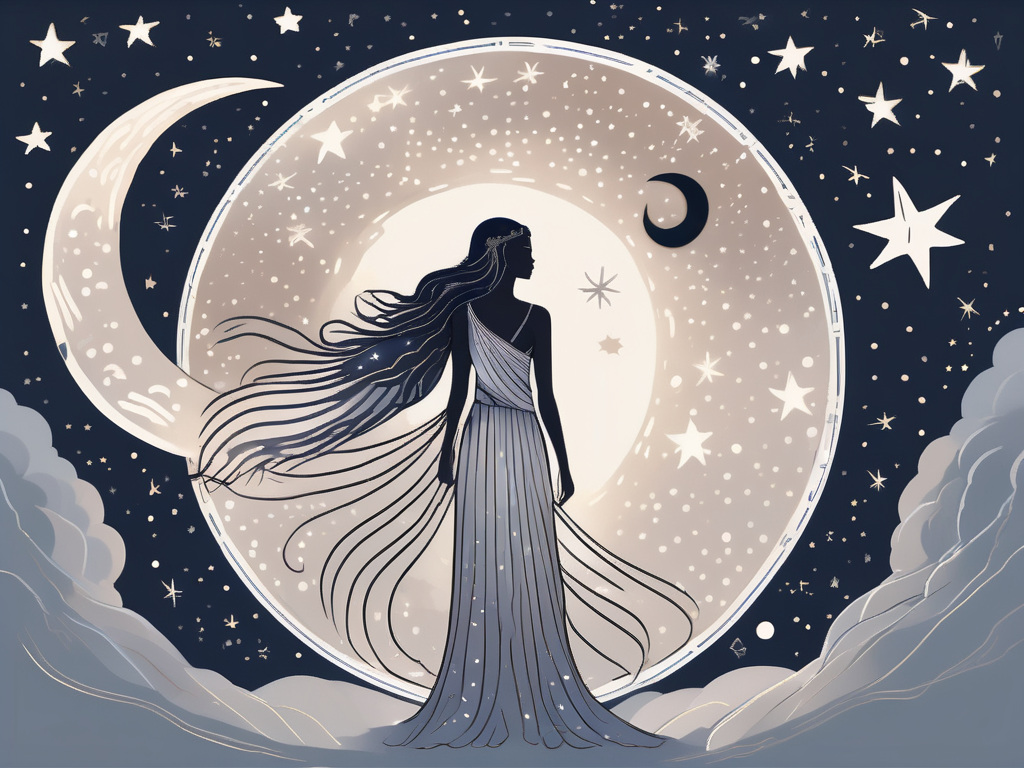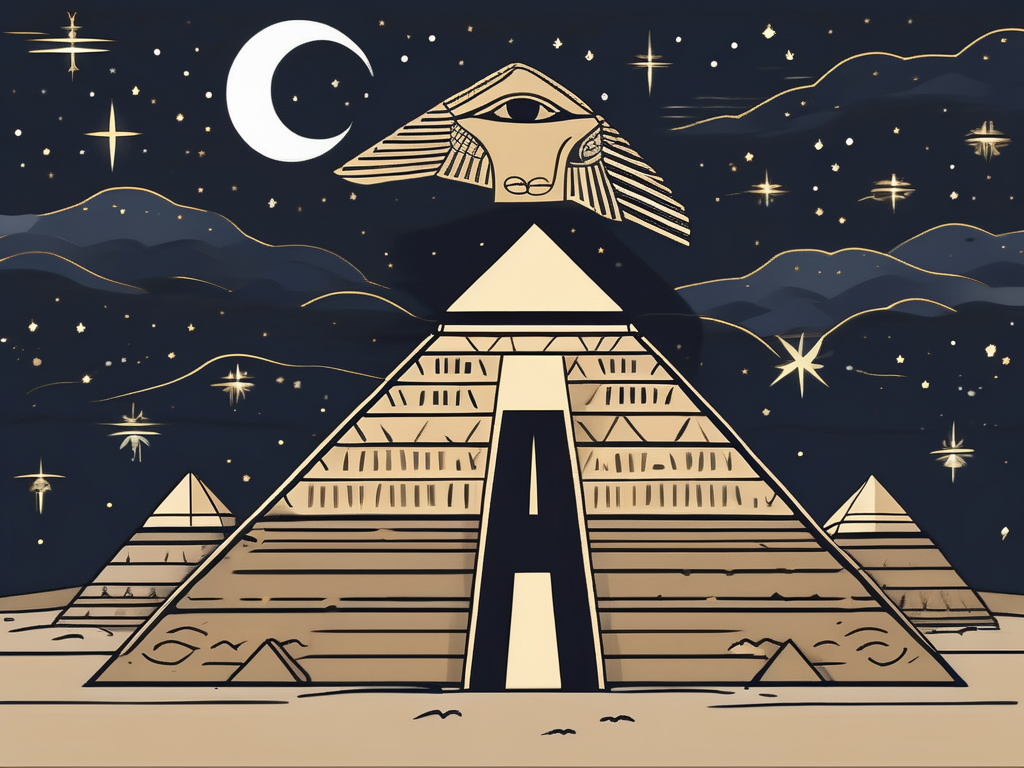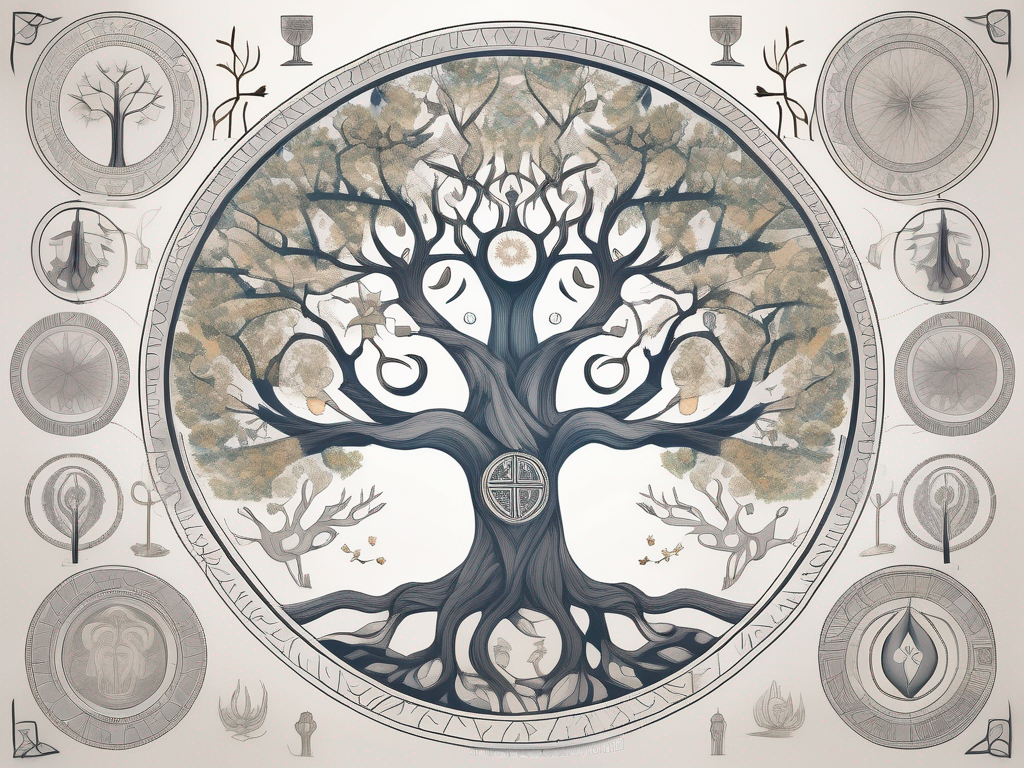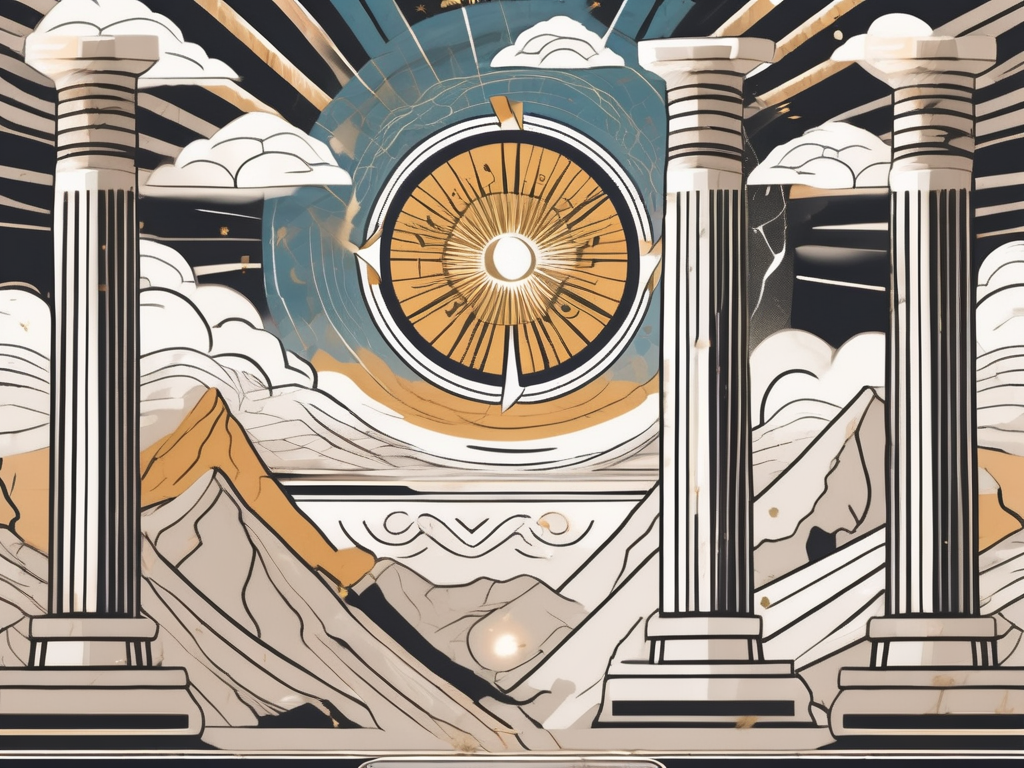Erebus, a figure shrouded in enigma and myth, plays a significant role in Greek mythology. In this article, we will delve into the various aspects of Erebus, from its origins to its representation in art and literature. We will also explore its significance in Greek religion and its comparative analysis in different mythologies. Brace yourself for a captivating journey through the realms of darkness!
Understanding the Origin of Erebus
The birth of Erebus in Greek mythology is a tale filled with intrigue and fascination. According to ancient texts, Erebus is believed to be one of the primordial deities born out of Chaos. This divine being emerged at the very beginning of existence, before the creation of the world as we know it.
As we delve deeper into the mythological realm, we discover that Erebus holds a unique position in the rich tapestry of Greek mythology. It is said that Erebus was born from the union of Nyx, the Goddess of Night, and Erebos, the God of Darkness. This union gave rise to a deity intricately linked to the primeval forces of the cosmos.
The significance of Erebus in Greek mythology can be seen in its appearances in various ancient texts, including Hesiod’s Theogony. In this ancient poem that chronicles the genealogy of the Greek gods, Erebus is depicted as a figure of immense power and mystery. Erebus is described as the brother and consort of Nyx, giving birth to a multitude of offspring, including the well-known deities such as Thanatos (Death) and Hypnos (Sleep).
Through its portrayal in Hesiod’s Theogony, Erebus solidifies its position as a prominent figure in Greek mythology and lays the groundwork for its influential role in the Greek pantheon. The intricate connections between Erebus, Nyx, and the forces of darkness and night highlight the complexity of the ancient Greek understanding of the cosmos.
Furthermore, Erebus’ role as the progenitor of deities like Thanatos and Hypnos adds depth to its character. Thanatos, the personification of death, and Hypnos, the personification of sleep, are both essential aspects of human existence. Their origin from Erebus underscores the fundamental role this primordial deity plays in shaping the human experience.
In conclusion, the origin of Erebus in Greek mythology is a captivating tale that reveals the intricate connections between primordial deities and the forces that govern the cosmos. From its birth out of Chaos to its role as the consort of Nyx and the progenitor of important deities, Erebus holds a significant place in the pantheon of Greek gods. Understanding Erebus’ origins deepens our appreciation for the complexity and richness of Greek mythology.
The Role of Erebus in the Greek Pantheon
Erebus’ connection to the underworld further solidifies its significance in Greek mythology and the pantheon of gods.
Erebus, the personification of primordial darkness, holds a prominent place in the Greek pantheon due to its close association with the dark depths of the underworld. In Greek mythology, Erebus is often depicted as a realm or a dark mist that brings forth the souls of the deceased into the afterlife. This portrayal emphasizes Erebus’ role as the gateway to the underworld, representing the transition between life and death, and embodying the journey into the unknown.
Delving deeper into Erebus’ significance, its relationships with other gods shed light on its multifaceted nature. One of the most notable connections is Erebus’ union with Nyx, the goddess of night. This union not only produced a host of divine offspring, including Hypnos (the god of sleep) and Thanatos (the god of death), but it also symbolizes the intertwining of night and darkness. Erebus and Nyx’s union represents the inseparable bond between the primordial forces of darkness and the mysteries of the night.
Furthermore, Erebus’ interactions with other gods, such as Thanatos and Hypnos, highlight its crucial role in the cycle of life and death. Thanatos, the personification of death, is often depicted as a winged figure, closely associated with Erebus. Together, they ensure the smooth transition of souls from the realm of the living to the realm of the dead. Hypnos, the god of sleep, is another deity closely linked to Erebus. As the brother of Thanatos and the son of Nyx and Erebus, Hypnos brings peaceful slumber to both mortals and immortals, allowing them to rest and rejuvenate.
It is through these intricate relationships and associations that Erebus establishes its significance within the Greek pantheon. As the embodiment of primordial darkness and the gateway to the underworld, Erebus plays a vital role in the cycle of life and death, connecting mortals and gods alike to the mysteries of the afterlife.
Symbolism and Representation of Erebus
Erebus’ symbolic significance extends beyond its role in Greek mythology, leaving a lasting imprint on various artistic and cultural representations.
Erebus, the personification of darkness, holds a profound symbolic meaning that transcends time and borders. Its enigmatic nature has fascinated and captivated the minds of artists, writers, and thinkers throughout history, leading to a multitude of interpretations and representations.
Erebus as a Symbol of Darkness
As the personification of darkness, Erebus embodies the fearsome and mysterious aspects of the unknown. Its symbolism resonates across different cultures and periods, serving as a metaphor for the depths of the human psyche and the hidden recesses of the universe.
In ancient Greek mythology, Erebus was believed to be the offspring of Chaos, the primordial void from which all creation emerged. It was said to be the realm where the dead resided, a place of eternal darkness and shadow. This association with the afterlife further deepened its symbolic significance, representing the existential questions that have plagued humanity since time immemorial.
Erebus’ association with darkness has inspired countless artists, writers, and thinkers to explore the depths of the human experience. From the haunting poetry of Edgar Allan Poe to the brooding paintings of Caravaggio, the concept of Erebus has provided a rich source of inspiration for creative minds seeking to delve into the complexities of the human condition.
Artistic Representations of Erebus
Erebus’ enigmatic nature has been captured in various artistic forms. From ancient sculptures to modern paintings, artists have sought to depict the essence of Erebus and convey its significance.
Ancient Greek sculptures often portrayed Erebus as a shadowy figure, shrouded in darkness and mystery. These sculptures, meticulously crafted with intricate details, aimed to evoke a sense of awe and reverence for the unknown.
In Renaissance art, Erebus was frequently depicted in allegorical paintings, symbolizing the darker aspects of human existence. Artists utilized dramatic lighting and chiaroscuro techniques to create a stark contrast between light and shadow, heightening the sense of mystery and inviting viewers to contemplate the realms Erebus represents.
Modern artists continue to explore the symbolism of Erebus, employing various mediums and styles to capture its essence. From abstract installations that evoke a sense of foreboding to digital art that plays with light and shadow, contemporary interpretations of Erebus push the boundaries of artistic expression and challenge our perception of darkness.
Moreover, Erebus’ influence extends beyond the realm of visual arts. It has inspired composers to create haunting melodies that evoke a sense of melancholy and introspection, and writers to craft gripping narratives that explore the depths of the human soul.
In conclusion, Erebus’ symbolism and representation have left an indelible mark on the artistic and cultural landscape. Its association with darkness and the unknown has inspired countless creative minds to delve into the depths of the human experience, inviting us to contemplate the mysteries that lie within ourselves and the universe.
The Influence of Erebus in Literature and Culture
Throughout the ages, Erebus’ presence has permeated literature, leaving its mark on both ancient texts and contemporary interpretations.
Erebus in Ancient Greek Literature
The influence of Erebus in ancient Greek literature is undeniable. Various poets and playwrights have woven the theme of darkness and the underworld into their works, drawing inspiration from Erebus’ mythical origins.
One notable example is the epic poem “The Odyssey” by Homer, which features encounters with the realm of Hades, further emphasizing Erebus’ connection to the afterlife.
Modern Interpretations of Erebus
Erebus’ allure and enigmatic nature continue to captivate modern minds. Contemporary authors, filmmakers, and musicians often draw on the themes of darkness and hidden depths, channeling the essence of Erebus into their creations.
Fascination with Erebus extends beyond its ancient Greek origins, transcending cultural boundaries and resonating with people worldwide.
Theological Perspectives on Erebus
From a theological standpoint, Erebus offers a unique lens through which to examine Greek religion and its connections to other mythologies.
Erebus in the Context of Greek Religion
Erebus’ role in Greek religion reflects the complex and multifaceted nature of ancient beliefs. Its association with darkness and the underworld adds depth to the Greek pantheon, highlighting the diverse range of divine beings.
Moreover, Erebus’ connection to concepts such as life, death, and the afterlife underscores the religious significance it held for the ancient Greeks.
Comparative Analysis of Erebus in Different Mythologies
While Erebus is primarily known through Greek mythology, its counterparts can be found in other mythological traditions. A comparative analysis of Erebus in different mythologies unveils the universal themes it represents across cultures.
From the Egyptian god Amun to the Norse deity Niflheim, the concept of primordial darkness and the underworld echoes throughout various mythologies, highlighting the timeless appeal of Erebus and its pervasive influence.
As we conclude this exploration of Erebus, we are left with a sense of wonder and intrigue. This Greek god, born from the depths of Chaos, continues to captivate our imagination and influence our understanding of darkness, the unknown, and the mysteries that lie beyond.
